
Karel Šejna (1 November 1896, Zálezly – 17 December 1982, Prague) was a Czech double bassist and conductor, the principal conductor of the Czech Philharmonic Orchestra in 1950.

Karel Šejna (1 November 1896, Zálezly – 17 December 1982, Prague) was a Czech double bassist and conductor, the principal conductor of the Czech Philharmonic Orchestra in 1950.
Šejna's musical studies were at the Prague Conservatory under Professor Černý (double-bass, 1914–20) and later with K. B. Jirák (composition). As a young man he gave several concerts in Egypt, and on his return to Czechoslovakia in 1921 he was appointed the first double-bassist of the Czech Philharmonic Orchestra, and shortly after (on 25 July 1922) also conducted the orchestra at a concert in Žofín Palace in Prague. Some compositions including a song-cycle and a string quartet date from this time.
He began to conduct on recommendation of the principal conductor of the Czech Philharmonic of that time, Václav Talich. Talich gradually entrusted him with more difficult tasks, and later recommended him to the post of conductor of the Czechoslovak Railway Workers Symphony Orchestra (1925–1936). From 1926 to 1938 Šejna worked also as choirmaster of the Hlahol Choir in Vinohrady, travelling with them to Yugoslavia and Vienna. In 1938 he was hired as the conductor of the Czech Philharmonic Orchestra. He conducted hundreds of concerts, notably romantic repertoire, but also the music of 20th century. (He performed the Prague premiere of Janáček's Glagolitic Mass). In 1937-38 Šejna was engaged as guest conductor of the Budapest Philharmonic Orchestra.
After the emigration of Rafael Kubelík, the post-war chief of the orchestra, Šejna was for a short time appointed as the principal conductor of the Czech Philharmonic, touring with the orchestra to East and West Germany and to the UK. He was a noted interpreter of the music of Hector Berlioz, César Franck, Richard Strauss and especially of Gustav Mahler. [1] His last concert with the Czech Philharmonic took place on 11 February 1972, with Mahler's Symphony No. 4.
Šejna made more than 70 recordings, including Beethoven's Pastoral Symphony, Schubert's 8th symphony and Mahler's 4th symphony (soprano Maria Tauberová, recorded 1950) with Czech philharmonic. He was the first conductor to have recorded most of the works of Bedřich Smetana. He also recorded complete symphonies of Zdeněk Fibich and part of the work of Antonín Dvořák. [2]
Conducting the Czech Philharmonic Orchestra, he made in 1949 the premiere recording of Martinů's Symphony No. 3 on Supraphon. [3]
His 1959 recording of Dvořák's Slavonic Dances was awarded Cithare d´argent - Grand Prix de l´Association Française in Paris 1977.
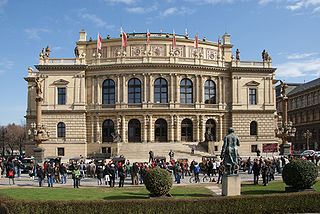
The Czech Philharmonic is a symphony orchestra based in Prague. The orchestra performs primarily at the Rudolfinum concert hall.

Karel Ančerl was a Czechoslovak conductor and composer, renowned especially for his performances of contemporary music and for his interpretations of music by Czech composers.
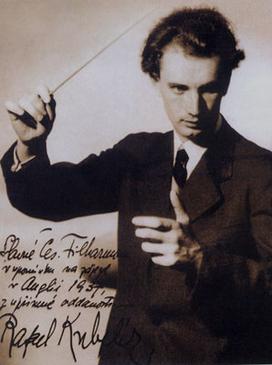
Rafael Jeroným Kubelík, KBE was a Czech conductor and composer.

Sir Alan Charles MacLaurin Mackerras (; was an Australian conductor. He was an authority on the operas of Janáček and Mozart, and the comic operas of Gilbert and Sullivan. He was long associated with the English National Opera and Welsh National Opera and was the first Australian chief conductor of the Sydney Symphony Orchestra. He also specialized in Czech music as a whole, producing many recordings for the Czech label Supraphon.
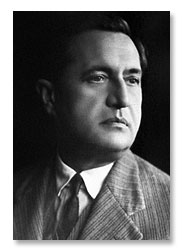
Václav Talich was a Czech violinist and later a musical pedagogue. He is remembered today as one of the greatest conductors of the 20th century, the object of countless reissues of his many recordings.

Jiří Bělohlávek, was a Czech conductor. He was a leading interpreter of Czech classical music, and became chief conductor of the Czech Philharmonic Orchestra in 1990, a role he would serve on two occasions during a combined span of seven years. He also served a six-year tenure as the chief conductor of the BBC Symphony Orchestra from 2006 to 2012. He gained international renown and repute for his performances of the works of Czech composers such as Antonín Dvořák and Bohuslav Martinů, and was credited as "the most profound proponent of Czech orchestral music" by Czech music specialist Professor Michael Beckerman.
The Bamberg Symphony is a renowned German orchestra top-class orchestra that has been residing in Bamberg since its foundation in 1946 and travels the world as a touring orchestra.

Břetislav Bakala was a Czech conductor, pianist, and composer. His career was centred on Brno and he was particularly associated with the music of Leoš Janáček.

Josef Suk was a Czech violinist, violist, chamber musician and conductor. In his home country he carried the title of National Artist.

Supraphon Music Publishing is a Czech record label, oriented mainly towards publishing classical music and popular music, with an emphasis on Czech and Slovak composers.
Julietta is an opera by Bohuslav Martinů, who also wrote the libretto, in French, based on the play Juliette ou la Clé des songes by the French author Georges Neveux. A libretto in Czech was later prepared for its premiere which took place at the Prague National Theatre on 16 March 1938. Julietta has become widely considered as Martinů's masterpiece.
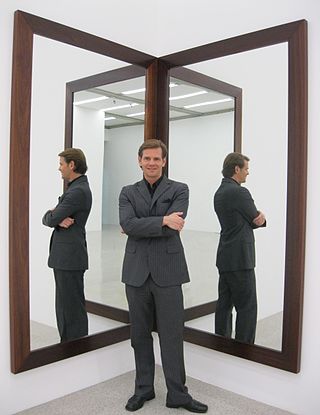
Paul Mauffray is an American conductor and laureat of the 2007 Bartók International Opera Conducting Competition, The American Prize for Conductors, and 1996 Freedman Conducting Competition. He has studied at the New Orleans Center for Creative Arts, Louisiana State University, Justus Liebig University (Giessen), Masaryk University (Brno), and earned a Masters of Music degree in Orchestra Conducting as an Associate Instructor / Assistant Conductor at Indiana University's Jacobs School of Music.

Antonio Pedrotti was an Italian conductor and composer.

Jakub Hrůša is a Czech conductor. He is chief conductor of the Bamberg Symphony.
Zdeněk Košler was a Czechoslovak conductor, who played an important role in Czechoslovak musical life of the second half of 20th century, notably during the 1960s and 1980s. He was particularly well known as an opera conductor.
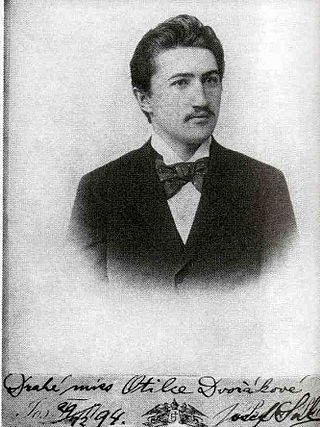
Czech composer Josef Suk's Second Symphony, named "Asrael", was completed in 1906 following the deaths first of his father-in-law, in 1904, and then of his wife. Inevitably mournful but also vital in nature, the five-movement, hour-long work is cast in C minor and scored in Straussian vein for large orchestra. It was published as Opus 27. The composer had married Otilie Dvořáková, daughter of his composition teacher, Antonín Dvořák.
The Vlach Quartet is the name of two consecutive classical string quartet musical ensembles, based in Prague, both of which were founded by members of the Vlach family. The original Vlach Quartet was founded by Josef Vlach in 1950 and wound up in 1975. In 1982 the New Vlach Quartet was founded by his daughter Jana Vlachova, with guidance her father, and came to be known as the Vlach Quartet of Prague, and is still active as a musical ensemble.
The Golden Spinning Wheel, Op. 109, B. 197, is a symphonic poem for orchestra by Antonín Dvořák, composed from January to April 1896. The work is inspired by the poem of the same name found in Kytice, a collection of folk ballads by Karel Jaromír Erben.
The Symphony No. 3, H. 299, is an orchestral composition by the Czech composer Bohuslav Martinů.
The Symphony No. 1, H. 289, is an orchestral composition by the Czech composer Bohuslav Martinů.